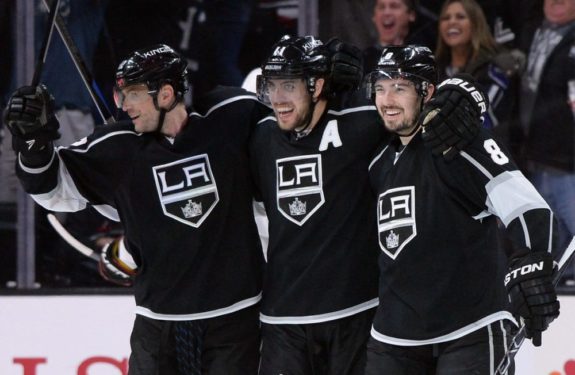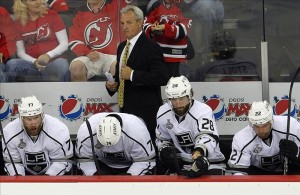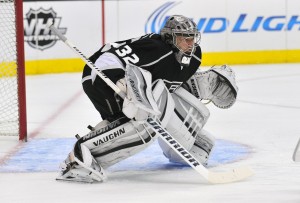With two Stanley Cups on their mantle, it’s hardly a trade secret that the Los Angeles Kings have been the NHL’s preeminent playoff team over the past three seasons. In fact, their combined postseason winning percentage over that span is a dominating .641 (41-23), a figure even more impressive considering the low seeds they’ve had when the playoffs began.

How low? Well, the best they’ve started the playoffs was as a fifth seed in 2012-13, and that’s the year they didn’t win it all, losing to the Chicago Blackhawks in the Western Conference finals. They barely squeaked into the playoffs as an eighth seed in 2011-12, and we all remember the epic playoff run they had to win their first Stanley Cup that season. The Kings were a sixth seed last year and poof — another Cup.
The Kings turn up the heat in February
The Hyde-becomes-Jekyll phenomenon isn’t just limited to the postseason. Over the past five seasons the pattern has been exactly the same: the Kings play inconsistent hockey until February 1. Once that date hits, a light switch seems to flip on and almost immediately, the club goes on a tear. The pattern is so predictable that you can set your calendar to it.
See for yourself:
2010-11
Head coach Terry Murray was at the helm for his third season, fresh off the most successful regular season in recent Kings memory. Los Angeles had gone 46-27-9 for 101 points in 2009-10, good for third place in the Pacific division. As a young team with almost no playoff experience, the Kings lost in the opening round to the Vancouver Canucks.
As the calendar turned to February, 2011, the Kings appeared to be regressing. L.A. was just 23-25-3, in serious jeopardy of missing the playoffs for the seventh time in eight years. Over the final 31 games, however, they went 23-5-3, earning 49 out of a possible final 62 points. That finishing kick earned them the 7th seed, where they lost to the San Jose Sharks 4-2 in the opening round of the playoffs.
2011-12

Lost in the magic of their record-setting 16-4 playoff run to win the Cup was the Kings’ sprint to the finish line just to make it in. Los Angeles finished with an overall winning percentage of .579 (40-27-15), but was a sizzling .659 percentage after February 1. Noteworthy in an inconsistent, rags-to-rches season was that Terry Murray was let go and Darryl Sutter became head coach.
Counting the postseason, the Kings went 29-10-3 over their final 42 games. That’s damn good.
2012-13
This one qualifies on a technicality, as the lockout limited the season to just 48 games. After posting a 2-2-2 record in January once the season resumed, the Kings finished (starting February 1) 25-14-3, a very solid .631 winning percentage.
The Kings nuked the Blues in the opening round of the playoffs and then defeated San Jose in the conference semifinals, before losing to the Blackhawks 4-1.
2013-14
Los Angeles wasn’t doing too badly as February 1 rolled around. Its record was 30-20-6, definitely in sight of the playoffs. That being said, nobody turns it on during the stretch better than L.A. and once again, they did so here, finishing the 2013-14 regular season 16-8-2 for a final 46-28-8 (100 points) record.
Unlike the blitzkrieg they displayed while winning their first championship, the Kings were the comeback kids, overcoming an 0-3 series deficit against San Jose and 2-3 against the Ducks. They outlasted the Blackhawks in a wild 7-game series and then stomped the New York Rangers 4-1 for their second Stanley Cup.
2014-15
Obviously, this season has yet to fully play itself out. However, as always, things are going true to form.

The Kings were a pedestrian 21-16-12 heading into February, sinking as low as 12th in the crowded Western Conference playoff race. After losing its first two games of the month, Los Angeles went on an eight-game winning streak, propelling itself into the playoff mix. A three-game skid dropped them back a bit, but a 4-1-1 record over their last six games has them on the edge of the playoffs once again.
The Kings were built for the playoffs
Los Angeles doesn’t need the high expectations associated with a top seed. In fact, they almost seem to actively disdain the very idea, as they never come close to earning home ice advantage in the opening round of the playoffs.
For the Kings, it’s enough to just get into the dance. Judging by their history of fast finishes, it looks like they’ll do so again this year. If so, watch out, Western conference — the Kings were built for the playoffs.
No matter what the outcome, the last five years have proven one thing: the Kings’ finishing kick is ridiculous. Ridiculously good, that is.